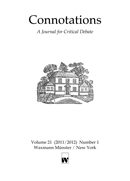Articles in this issue
- Poetic Economy: Ellipsis and Redundancy in Literature
Matthias Bauer, and [else], Vol. 21: 159-64
- In Their Own Words: On Writing in Second Person
Joshua Parker, and [else], Vol. 21: 165-76
- Leaps and Bounds: Hawthorne’s Strategies of Poetic Economy
Elena Anastasaki, and [else], Vol. 21: 177-197
- "Mistah Kurtz—he dead" in Company: Redundancy and Ellipsis
William Harmon, and [else], Vol. 21: 198-217
- Elegance and Poetic Economy in John Crowe Ransom and F. T. Prince
Rajeev S. Patke, and [else], Vol. 21: 218-40
- Pinter’s Fractured Discourse in The Homecoming
Maurice Charney, and [else], Vol. 21: 241-55
- Literary Allusions and Poetic Economy: Billy Collins’s "Albany" and William Wordsworth’s "I wandered lonely as a cloud
Judith Saunders, and [else], Vol. 21: 256-71
- The Homosexual Temptation of the Son in Milton’s Paradise Regained: A Reply to John T. Shawcross and Claude J. Summers
David V. Urban, and [else], Vol. 21: 272-77
- Re-reading Gulliver as Quixote: Toward a Theory a Quixotic Exceptionalism
Aaron R. Hanlon, and [else], Vol. 21: 278-303
- On the Shore of Interpretation: The Theory and Reading of the Image in Imagism
Andrew Hay, and [else], Vol. 21: 304-26
- "As I have heard Jeeves put it": A Response to Lawrence Dugan’s "Worcestershirewards: Wodehouse and the Baroque"
Laura Mooneyham White, and [else], Vol. 21: 327-333
- The Family Reunion: Eliot, James, and the Buried Life: A Response to Edward Lobb
Miriam M. Chirico, and [else], Vol. 21: 334-45
- Tragedy and Soap: Orton’s Good and Faithful Servant
Simon Shepherd, and [else], Vol. 21: 346-62
- Telling the Difference: Clones, Doubles and What’s in Between
Amit Marcus, and [else], Vol. 21: 363-96
- Untold and Unlived Lives in Kazuo Ishiguro’s Never Let Me Go: A Response to Burkhard Niederhoff
Rebecca Suter, and [else], Vol. 21: 397-406
[/pod_if_field__1]
